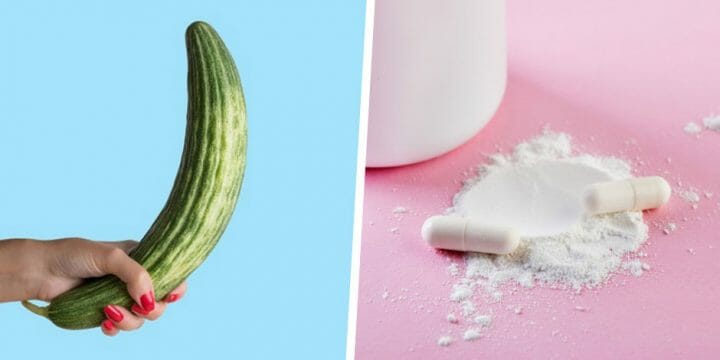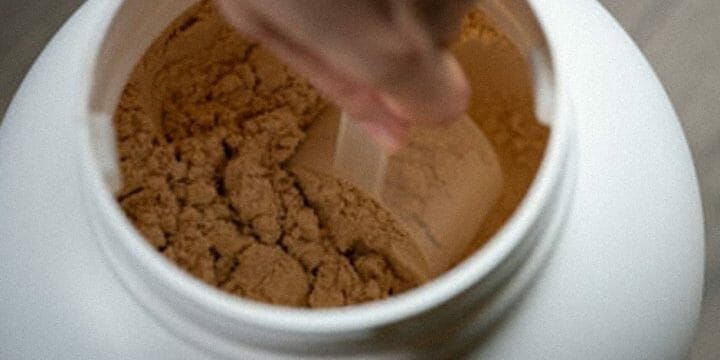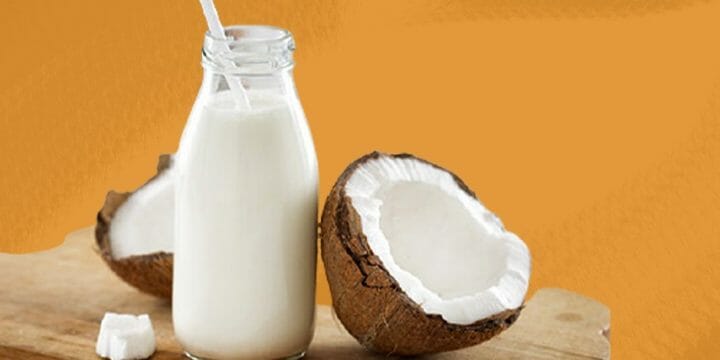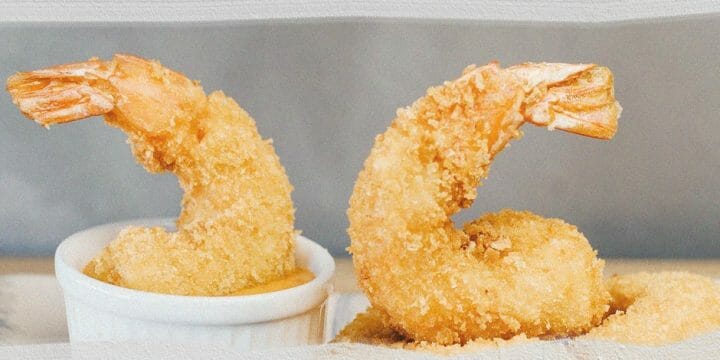As a certified personal trainer who has worked with clients following various dietary preferences, including veganism, I've seen firsthand the importance of understanding what goes into our favorite treats.
This mouth-watering, rich dessert is a favorite around the world, and if you have a sweet tooth but practice a vegan diet, you may wonder — is baklava vegan?
From my experience in nutrition and fitness, I know that the answer depends on several factors, so let’s dive in and find out.
Quick Summary
- While traditional baklava may contain non-vegan elements, variations with vegan-friendly ingredients and syrups are increasingly common.
- Made from simple ingredients like flour, water, and vegetable oil, phyllo dough usually aligns with vegan dietary restrictions.
- According to the National Center for Biotechnology Information, palm oil, often used in baklava, contains 50% saturated fats, 40% monounsaturated fats, and 10% polyunsaturated fats, raising health and ethical concerns for vegans.
- In my experience, it's a great substitute for honey, retaining the dessert's traditional sweetness while being ethically suitable for vegans.
Is Baklava Vegan?
Baklava is vegan. However, it all depends on the ingredients and syrup, so there may be some cases on non-vegan baklava. I’ll get into more detail.
Can Vegans Eat Filo Pastry (Phyllo Dough)?
Yes, vegans can eat phyllo dough. Is baklava vegan, isn’t the only question that torments vegans.
It’s typically made from unleavened dough, which means there’s no rising agent, such as yeast. Other ingredients include vegetable oil (most commonly olive oil), a dash of salt, and warm water.
7 Problematic Ingredients

There are different baklava recipes, and some aren’t vegan, so let’s see what could make this dessert not vegan-friendly:
1. Butter
Having in mind that baklava originates from the place with an abundance of olives, olive oil is typically the go-to ingredient when making the dough. However, some recipes call for butter, so be careful when purchasing the dough.
2. Palm Oil
As I’ve said many times, palm oil is vegan, but how it’s produced is making many vegans (myself included) consider it non-vegan. To plant palms that give the oil, the land is cleared, which leads to habitat loss, endangering the animals, and harming the environment.
According to one of the studies from the National Center for Biotechnology Information website, palm oil reduces plasma cholesterol, apolipoprotein B, thromboxane B2, and platelet factor IV [1].
3. Animal Fats
Animal fats are another possible non-vegan ingredient in store-bought phyllo dough.
4. L-Cysteine
L-cysteine is an amino acid commonly found in bread, but it can sometimes be used in making the dough. The trouble with L-cysteine is that it can be sourced from plants or animals, and even human hair.
According to another study from the National Center for Biotechnology Information website, L-Cysteine is a powerful antioxidant useful for treating several disorders that result from the generation of free oxygen radicals [2].
5. Glycerol/Glycerine
This is another ingredient commonly found in store-bought pastry. Like L-cysteine, it can also be sourced from plants (typically soy) or animals (rendered animal fat). Unless the product is marked as vegan, stay away from dough containing glycerol or glycerine.
6. Eggs
As I said, some phyllo dough recipes require eggs or egg yolk, so this is another ingredient to pay attention to.
7. E Numbers
Store-bought phyllo pastry can contain various E numbers. They can be vegan or animal-derived, so unless the product is marked as vegan, you might want to refrain from experimenting with it.
What About Baklava's Fillings?
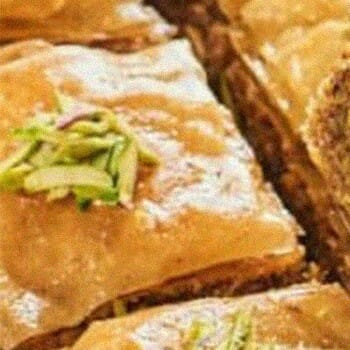
Baklava's fillings include chopped nuts, cinnamon, and cardamom. These are vegan, so what could be non-vegan about these plant-based ingredients?
It might come as a shock, but nuts can be non-vegan.
For example, growing almonds include bee exploitation, where farmers use bees for the so-called "managed pollination."
Because of this, many vegans today don't consider almonds vegan, at least in my experience.
Is the Syrup Vegan?
In most cases, Baklava syrup is vegan. Baklava syrup is often made from sugar, lemon juice, rose water, orange blossom water, or similar flower waters.
However, some recipes call for honey, and I don’t even need to emphasize honey isn’t vegan.
Makos Koukakis, founder of The Hungry Bites, suggests using maple syrup as substitute if the recipe calls for honey.
Always use Vegetable Oil
You’re supposed to grease the pan before baking baklava, so if you use butter, even vegan baklava will be non-vegan. Always use vegetable oil or vegan butter.
Based on my experience, there’s also the issue of possible cross-contamination.
Vegan Homemade Baklava Recipe

In my experience, it's pretty easy to make vegan baklava if you buy pre-made phyllo dough. This is my favorite Middle Eastern baklava recipe, which requires some time, but the result is worth it. For this recipe, you'll need:
For the filling:
- Chopped pecans, pistachios, and walnuts — 1 cup of each
- 5 tbsp agave or maple syrup
- 1 ½ tsp ground cinnamon
- 1 ½ tsp ground cardamom
- 1 tsp lemon zest
- 1 tsp orange zest
For assembling the vegan baklava:
- 8oz pre-made phyllo pastry
- 2 tbsp olive oil
For the baklava syrup:
- ¾ cup water
- 6 tbsp agave nectar or maple syrup
- 1 stick cinnamon (optional)
- 5 whole cloves (optional)
- 1 tsp lemon zest
- 2 tsp fresh orange juice (optional)
- Start by making the syrup so it can cool down while you make vegan baklava. Put all the syrup ingredients into a saucepan, bring them to a boil, and reduce it to a steady simmer.
- Cook for 15–20 minutes, or until it's reduced and thick enough to coat the back of a spoon. Set aside and leave to cool.
- Next, you want to make the filling. Combine the chopped nuts, spices, lemon, and orange zest, and add maple or agave nectar to the mixture.
- Preheat your oven to 350℉ and grease an 8x8-inch baking dish.
- Next, open your filo pastry, unroll it gently, and trim the edges to fit your baking dish. Add two sheets of dough to the pan at a time. Lightly brush the layers of phyllo dough with olive oil, add the nuts, and drizzle with some agave nectar if you like.
- Add another layer of the pastry and repeat the process until your baklava reaches a 1.5-inch thickness. Or, make it as thick as you want.
- Bake for some 40-45 minutes and use a sharp knife to cut it while it’s still hot. Drizzle the syrup, put some nuts on top of the baklava, let cool, and serve.
“The oldest recipes for baklava are fried. They had to fry them in a pan and put another pan on top and flip it over so it would cook on both sides. Obviously, once they got a chance to get ovens it was a lot more convenient.”
- Charles Perry, Food Historian
FAQs
What Is the Historical Origin and Evolution of Baklava?
Baklava's history dates back to ancient Middle Eastern civilizations, where it evolved through various cultures, leading to diverse interpretations, including vegan versions. This rich history reflects the dessert's adaptability and enduring popularity across different regions and dietary preferences.
How Does Nutritional Content Compare Between Traditional and Vegan Baklava?
Traditional baklava is typically richer in calories and sugar due to ingredients like honey, while vegan baklava often uses natural sweeteners like date syrup, resulting in potentially lower sugar content. The use of plant-based ingredients in vegan baklava can also alter its fat profile, making it a different, yet still indulgent, option.
What Is the Environmental Impact of Ingredients in Vegan Baklava?
Vegan baklava ingredients, such as plant-based sweeteners and vegan butter, generally have a lower environmental impact compared to traditional ingredients like honey and dairy butter. This is due to factors like lower greenhouse gas emissions and reduced water usage in plant-based ingredient production.
Are There Global Variations of Vegan Baklava?
Yes, vegan baklava varies globally, with each region incorporating local ingredients and flavors. For instance, some versions might use regional nuts or fruits and sweeteners like agave or maple syrup, reflecting the diversity of vegan cuisine worldwide.
What Are Some Ideal Pairings for Vegan Baklava?
Vegan baklava pairs wonderfully with a range of beverages, from traditional Turkish tea or Greek coffee to modern alternatives like almond milk lattes or even a sweet dessert wine. These pairings enhance the dessert's flavors, making for a delightful gastronomic experience.
References:
- https://www.ncbi.nlm.nih.gov/pmc/articles/PMC5044790/
- https://www.ncbi.nlm.nih.gov/pmc/articles/PMC6017824/
About The Author
You May Also Like
